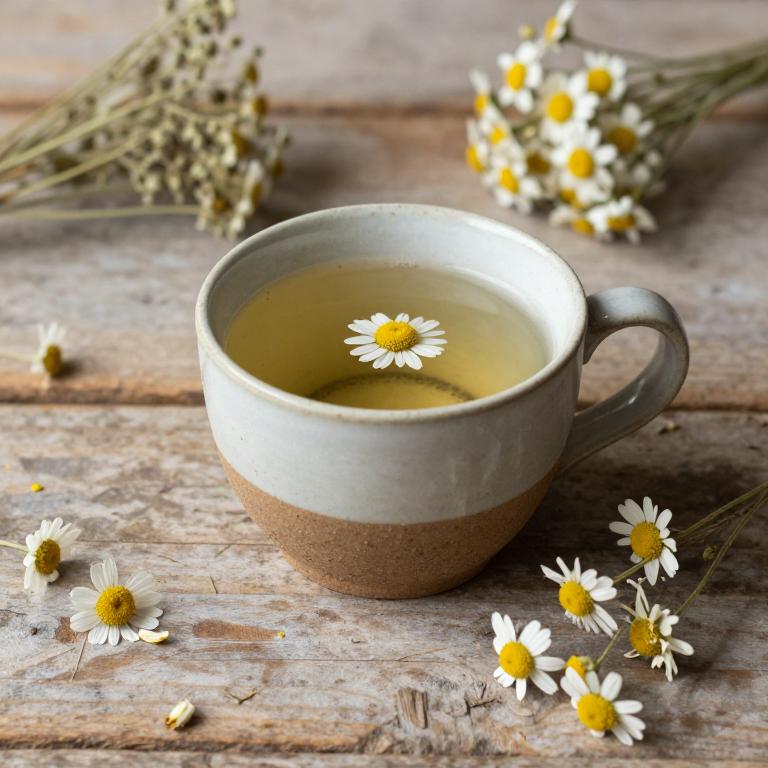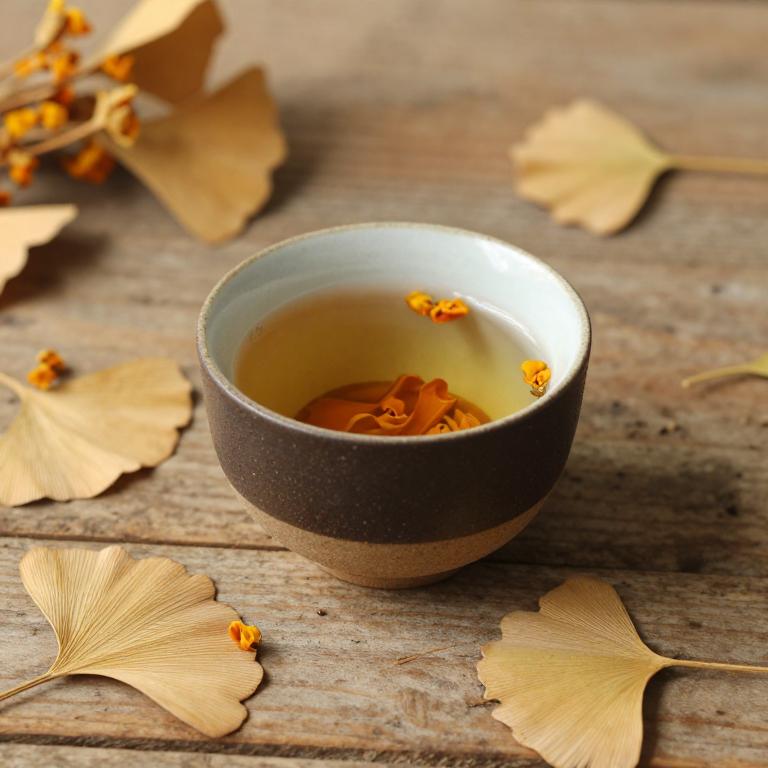10 Best Herbal Teas For Tinnitus

Herbal teas have gained popularity as a natural remedy for tinnitus, offering a gentle and soothing alternative to conventional treatments.
Certain herbs such as ginger, chamomile, and lavender are believed to reduce stress and inflammation, which may contribute to tinnitus symptoms. These teas work by promoting relaxation and improving blood circulation, which can help alleviate the persistent ringing or buzzing in the ears. While they are generally safe, it is important to consult a healthcare professional before using herbal remedies, especially if you have underlying health conditions or are taking other medications.
Overall, herbal teas can be a complementary approach to managing tinnitus, though they should not replace medical advice or treatment.
Table of Contents
- 1. Salvia (Salvia officinalis)
- 2. Chaste tree (Vitex agnus-castus)
- 3. German chamomile (Chamomilla recutita)
- 4. Stinging nettle (Urtica dioica)
- 5. Rosemary (Rosmarinus officinalis)
- 6. St. john's wort (Hypericum perforatum)
- 7. Ginkgo (Ginkgo biloba)
- 8. Chamomile (Matricaria chamomilla)
- 9. Echinacea (Echinacea purpurea)
- 10. Yarrow (Achillea millefolium)
1. Salvia (Salvia officinalis)

Salvia officinalis, commonly known as sage, has been traditionally used in herbal teas for its potential benefits in managing tinnitus, a condition characterized by ringing or buzzing in the ears.
While scientific research on sage's direct effects on tinnitus is limited, some studies suggest that its antioxidant and anti-inflammatory properties may help reduce inner ear damage and improve auditory function. Sage tea is often prepared by steeping dried leaves in hot water, and it is believed to support overall ear health by reducing oxidative stress and promoting detoxification. Many individuals with tinnitus use sage tea as a complementary therapy alongside conventional treatments, though it is important to consult a healthcare professional before incorporating it into a treatment plan.
Despite its historical use, more clinical trials are needed to fully understand its efficacy and safety for tinnitus management.
2. Chaste tree (Vitex agnus-castus)

Vitex agnus-castus, commonly known as chasteberry, is a herbal remedy that has been traditionally used to support hormonal balance and has recently gained attention for its potential benefits in managing tinnitus.
While scientific research on its direct effects on tinnitus is limited, some studies suggest that its adaptogenic properties may help reduce stress and anxiety, which are known contributors to tinnitus symptoms. The herb is believed to influence the hypothalamic-pituitary-adrenal (HPA) axis, potentially alleviating the physiological stress responses that exacerbate tinnitus. Herbal teas made from Vitex agnus-castus are often consumed as part of a holistic approach to tinnitus management, alongside other lifestyle and dietary modifications.
However, it is important to consult with a healthcare professional before using chasteberry, especially for individuals with existing health conditions or those taking medications.
3. German chamomile (Chamomilla recutita)

Chamomilla recutita, commonly known as German chamomile, has been traditionally used for its calming and anti-inflammatory properties, making it a popular herbal choice for individuals experiencing tinnitus.
This herb contains compounds such as apigenin, which may help reduce inflammation and oxidative stress in the auditory system, potentially alleviating tinnitus symptoms. While scientific research on chamomile’s direct impact on tinnitus is limited, some studies suggest it may support overall ear health and reduce stress-related noise in the ears. Many people use chamomile tea as a natural remedy to promote relaxation and improve sleep, which can indirectly help manage tinnitus.
However, it is important to consult a healthcare professional before using chamomile, especially if you are on medication or have allergies, to ensure it is safe and appropriate for your condition.
4. Stinging nettle (Urtica dioica)

Urtica dioica, commonly known as stinging nettle, has been traditionally used in herbal medicine for its potential health benefits, and some anecdotal evidence suggests it may support ear health.
While scientific research on its specific effects on tinnitus is limited, stinging nettle tea is believed to help reduce inflammation and improve circulation, which may indirectly support hearing function. The tea is typically made by steeping fresh or dried leaves in hot water, and it is often consumed as part of a holistic approach to managing tinnitus symptoms. Some individuals report a reduction in tinnitus severity after regular consumption, though results may vary and should not replace professional medical advice.
As with any herbal remedy, it is important to consult with a healthcare provider before incorporating stinging nettle tea into a tinnitus management regimen.
5. Rosemary (Rosmarinus officinalis)

Rosmarinus officinalis, commonly known as rosemary, is a popular herb used in herbal teas for its potential benefits in alleviating tinnitus symptoms.
This aromatic plant contains compounds like rosmarinic acid and carnosic acid, which are believed to have antioxidant and anti-inflammatory properties that may support ear health. Rosemary tea is often consumed to improve circulation, which can help reduce the ringing or buzzing sounds associated with tinnitus. While scientific evidence is limited, many users report a soothing effect when drinking rosemary tea regularly.
It is recommended to consult with a healthcare provider before using rosemary tea as a complementary treatment for tinnitus.
6. St. john's wort (Hypericum perforatum)

Hypericum perforatum, commonly known as St. John's Wort, is a herbal remedy that has been traditionally used for its potential health benefits, including its effects on mood and anxiety.
While it is well-known for its antidepressant properties, some studies suggest that it may also have a positive impact on tinnitus, a condition characterized by ringing or buzzing in the ears. The active compounds in St. John's Wort, such as hypericin and hyperforin, are believed to influence neurotransmitter levels and reduce inflammation, which may help alleviate tinnitus symptoms. However, it is important to note that hypericum perforatum can interact with various medications, so it should be used under the guidance of a healthcare professional.
When brewed as a herbal tea, St. John's Wort may offer a gentle and natural approach to managing tinnitus, though more research is needed to fully understand its efficacy.
7. Ginkgo (Ginkgo biloba)

Ginkgo biloba herbal tea is often used as a natural remedy for tinnitus due to its potential to improve blood circulation and support cognitive function.
The tea is derived from the leaves of the ginkgo tree, which has been used in traditional Chinese medicine for centuries. It contains bioactive compounds such as flavonoids and terpenoids that may help reduce inflammation and enhance auditory function. While some studies suggest it may alleviate tinnitus symptoms, more research is needed to confirm its effectiveness.
As with any herbal remedy, it is advisable to consult a healthcare professional before use, especially for individuals with existing medical conditions or those taking other medications.
8. Chamomile (Matricaria chamomilla)

Matricaria chamomilla, commonly known as chamomile, is a herbal remedy often used in the form of tea to support overall health, including potential relief for tinnitus.
Chamomile tea is believed to have calming properties that may help reduce stress and anxiety, which are known to exacerbate tinnitus symptoms. While scientific evidence on its effectiveness for tinnitus is limited, some studies suggest that its anti-inflammatory and antioxidant properties may contribute to ear health. It is typically consumed as a warm herbal infusion, often combined with other soothing herbs like lavender or peppermint.
As with any herbal remedy, it is advisable to consult a healthcare professional before use, especially for individuals with existing medical conditions or those taking medications.
9. Echinacea (Echinacea purpurea)

Echinacea purpurea, commonly known as purple coneflower, is a popular herbal remedy often used in teas to support immune health and reduce inflammation.
While scientific evidence directly linking echinacea to tinnitus relief is limited, some studies suggest that its anti-inflammatory and antioxidant properties may help alleviate symptoms associated with inner ear disorders. Herbal teas made from echinacea are believed to promote overall ear health by reducing oxidative stress and supporting the body's natural defenses. However, it is important to consult a healthcare professional before using echinacea for tinnitus, especially if you are taking other medications or have underlying health conditions.
As with any herbal supplement, individual responses may vary, and echinacea should not be considered a cure for tinnitus but rather a complementary approach to managing symptoms.
10. Yarrow (Achillea millefolium)

Achillea millefolium, commonly known as yarrow, has been traditionally used in herbal medicine for its potential health benefits, including its possible role in supporting ear health.
While scientific research on its direct effects on tinnitus is limited, some studies suggest that its anti-inflammatory and antioxidant properties may help reduce inner ear inflammation and oxidative stress, which are often associated with tinnitus. Herbal teas made from yarrow can be consumed as a complementary therapy to support overall ear health and potentially alleviate tinnitus symptoms. However, it is important to consult with a healthcare professional before using yarrow tea, especially for individuals with existing medical conditions or those taking medications.
As with any herbal remedy, individual responses may vary, and it should not replace conventional medical treatments for tinnitus.